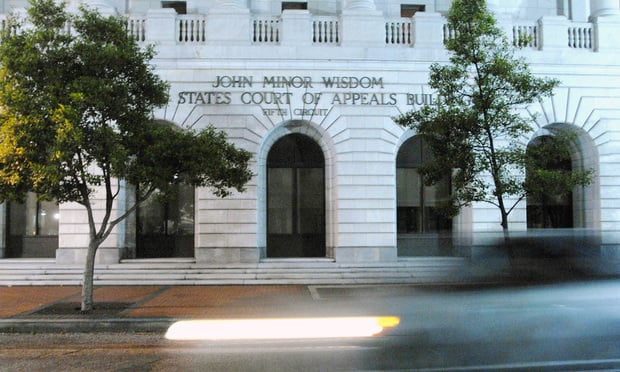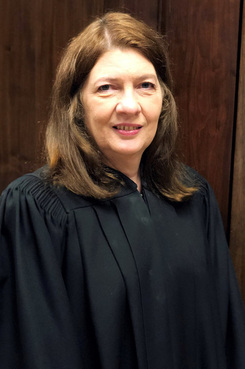Will Lawyers See A Difference As Fifth Circuit Swaps Chief Judges?
"From the attorneys' perspective, what they might notice the most is who is presiding at their oral arguments. Beyond that, you would have to get in the weeds of what's happening at the court," said Chief Judge Priscilla Owen of the U.S. Court of Appeals for the Fifth Circuit.
October 01, 2019 at 03:24 PM
4 minute read
 John Minor Wisdom U. S. Court of Appeals for the Fifth Circuit building in New Orleans. Photo: Rick Kopstein/ALM.
John Minor Wisdom U. S. Court of Appeals for the Fifth Circuit building in New Orleans. Photo: Rick Kopstein/ALM.
The chief-judge hat at the U.S. Court of Appeals for the Fifth Circuit has changed heads to Judge Priscilla Owen of Austin after the retirement of former Chief Judge Carl Stewart.
On her first day on the job Tuesday, Owen told Texas Lawyer that she's happy to assume the extra administrative responsibility of being the chief, although she acknowledged it's a lot of extra hard work.
Texas Lawyer chatted with Owen about how she became chief judge, all of the duties that come with the new role, and the differences that attorneys may notice under her leadership. Here are Owen's answers, edited for clarity and brevity.
 Chief Judge Priscilla Owen of the U.S. Court of Appeals for the Fifth Circuit. Courtesy photo.
Chief Judge Priscilla Owen of the U.S. Court of Appeals for the Fifth Circuit. Courtesy photo.How were you picked for this position?
It really wasn't up to me. It's a statutory change of command. A federal statute sets forth who is chief. Judge Stewart's seven-year term ended yesterday, and under the statute, the judge in active service who has the most seniority and hasn't reached the age of 65 becomes the chief judge. It's statutory succession. No one can serve as chief judge past their 70th birthday, and I will be 70 in five years.
Can you explain exactly what a chief judge does?
Primarily the chief judge role is an administrative one. The chief judge has a lot of responsibilities. It's for the whole circuit: not only the circuit judges, but the district court judges, all of the nonjudge judges who participate in the system. We have budget responsibility. If people complain about judges or other employees, there's a grievance system the chief judge is more or less in charge of overseeing. The chief judge presides at oral arguments. There are all kinds of other things. For example, court-appointed attorney vouchers: We have a section of people at the Fifth Circuit who look at those and make determinations and recommendations about whether they should be paid in full.
What are some of your main goals to accomplish in this new role?
Do my job to the best of my abilities and hopefully do it confidently. The Fifth Circuit, we have a great staff in place, and have for quite a while, who assist the chief judge and all the other judges, for that matter, with a lot of things. It's an administrative matter, essentially, to make sure the things that need to be taken care of are taken care of. There can be huge budgeting headaches—for example, I know Chief Judge Stewart had to deal with two government shutdowns. It's just a matter of dealing responsibly with all the administrative issues that come up.
In what ways do you think attorneys will see differences?
Every judge has their own personality. I have served under Chief Judge Carolyn Dineen King and then Edith Jones and then Carl Stewart. They were all great chief judges, but they all had personalities and management styles that were different. The circuit was well run under all of them. From the attorneys' perspective, what they might notice the most is who is presiding at their oral arguments. Beyond that, you would have to get in the weeds of what's happening at the court.
How will the presiding judges at oral argument be different?
It will be the en banc oral arguments, and the three-judge panels that I sit on. We have multiple panels set at the same time. Sometimes we have five panels. If I'm on one of them, I'll be presiding at that panel. I would be the one presiding at the en banc arguments.
This content has been archived. It is available through our partners, LexisNexis® and Bloomberg Law.
To view this content, please continue to their sites.
Not a Lexis Subscriber?
Subscribe Now
Not a Bloomberg Law Subscriber?
Subscribe Now
NOT FOR REPRINT
© 2025 ALM Global, LLC, All Rights Reserved. Request academic re-use from www.copyright.com. All other uses, submit a request to [email protected]. For more information visit Asset & Logo Licensing.
You Might Like
View All

Lawyers' Phones Are Ringing: What Should Employers Do If ICE Raids Their Business?
6 minute read

Read the Document: DOJ Releases Ex-Special Counsel's Report Explaining Trump Prosecutions
3 minute readTrending Stories
Who Got The Work
J. Brugh Lower of Gibbons has entered an appearance for industrial equipment supplier Devco Corporation in a pending trademark infringement lawsuit. The suit, accusing the defendant of selling knock-off Graco products, was filed Dec. 18 in New Jersey District Court by Rivkin Radler on behalf of Graco Inc. and Graco Minnesota. The case, assigned to U.S. District Judge Zahid N. Quraishi, is 3:24-cv-11294, Graco Inc. et al v. Devco Corporation.
Who Got The Work
Rebecca Maller-Stein and Kent A. Yalowitz of Arnold & Porter Kaye Scholer have entered their appearances for Hanaco Venture Capital and its executives, Lior Prosor and David Frankel, in a pending securities lawsuit. The action, filed on Dec. 24 in New York Southern District Court by Zell, Aron & Co. on behalf of Goldeneye Advisors, accuses the defendants of negligently and fraudulently managing the plaintiff's $1 million investment. The case, assigned to U.S. District Judge Vernon S. Broderick, is 1:24-cv-09918, Goldeneye Advisors, LLC v. Hanaco Venture Capital, Ltd. et al.
Who Got The Work
Attorneys from A&O Shearman has stepped in as defense counsel for Toronto-Dominion Bank and other defendants in a pending securities class action. The suit, filed Dec. 11 in New York Southern District Court by Bleichmar Fonti & Auld, accuses the defendants of concealing the bank's 'pervasive' deficiencies in regards to its compliance with the Bank Secrecy Act and the quality of its anti-money laundering controls. The case, assigned to U.S. District Judge Arun Subramanian, is 1:24-cv-09445, Gonzalez v. The Toronto-Dominion Bank et al.
Who Got The Work
Crown Castle International, a Pennsylvania company providing shared communications infrastructure, has turned to Luke D. Wolf of Gordon Rees Scully Mansukhani to fend off a pending breach-of-contract lawsuit. The court action, filed Nov. 25 in Michigan Eastern District Court by Hooper Hathaway PC on behalf of The Town Residences LLC, accuses Crown Castle of failing to transfer approximately $30,000 in utility payments from T-Mobile in breach of a roof-top lease and assignment agreement. The case, assigned to U.S. District Judge Susan K. Declercq, is 2:24-cv-13131, The Town Residences LLC v. T-Mobile US, Inc. et al.
Who Got The Work
Wilfred P. Coronato and Daniel M. Schwartz of McCarter & English have stepped in as defense counsel to Electrolux Home Products Inc. in a pending product liability lawsuit. The court action, filed Nov. 26 in New York Eastern District Court by Poulos Lopiccolo PC and Nagel Rice LLP on behalf of David Stern, alleges that the defendant's refrigerators’ drawers and shelving repeatedly break and fall apart within months after purchase. The case, assigned to U.S. District Judge Joan M. Azrack, is 2:24-cv-08204, Stern v. Electrolux Home Products, Inc.
Featured Firms
Law Offices of Gary Martin Hays & Associates, P.C.
(470) 294-1674
Law Offices of Mark E. Salomone
(857) 444-6468
Smith & Hassler
(713) 739-1250






